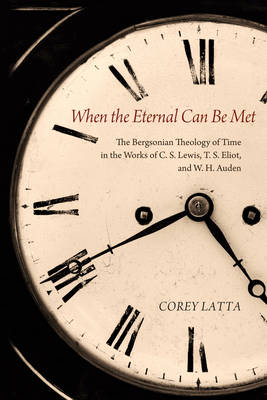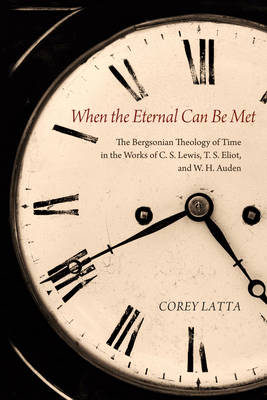
- Retrait gratuit dans votre magasin Club
- 7.000.000 titres dans notre catalogue
- Payer en toute sécurité
- Toujours un magasin près de chez vous
- Retrait gratuit dans votre magasin Club
- 7.000.0000 titres dans notre catalogue
- Payer en toute sécurité
- Toujours un magasin près de chez vous
When the Eternal Can Be Met
The Bergsonian Theology of Time in the Works of C. S. Lewis, T. S. Eliot, and W. H. Auden
Corey Latta
Livre relié | Anglais
69,45 €
+ 138 points
Format
Description
When the Eternal Can Be Met excavates the philosophy behind the theology of the twentieth century's most prominent Christian writers: C. S. Lewis, T. S. Eliot, and W. H. Auden. These three literary giants converted to Christianity within little more than a decade of one another, and interestingly, all three theological authors turned to the theme of time. All three authors also came to remarkably similar conclusions about time, positing that the temporal present moment allowed one to meet the eternal. Decades before Lewis, Eliot, and Auden sought to creatively construct a fictive or poetic theology of time, the prominent philosopher Henri Bergson wrote about time's power to transform an individual's emotional and spiritual state, a theory well known by Lewis, Eliot, and Auden. When the Eternal Can Be Met argues that one cannot fully understand Lewis, Eliot, and Auden's theology of time without understanding Bergson's theories. From the secular philosophy of Bergson dawned the most important works of literary theology and treatments of time of the twentieth century, and in the Bergson-influenced literary constructs of Lewis, Eliot, and Auden, a common theological articulation sounds out--time present is where humans meet God.
Spécifications
Parties prenantes
- Auteur(s) :
- Editeur:
Contenu
- Nombre de pages :
- 234
- Langue:
- Anglais
Caractéristiques
- EAN:
- 9781498268851
- Date de parution :
- 14-04-14
- Format:
- Livre relié
- Format numérique:
- Genaaid
- Dimensions :
- 152 mm x 229 mm
- Poids :
- 485 g

Les avis
Nous publions uniquement les avis qui respectent les conditions requises. Consultez nos conditions pour les avis.






